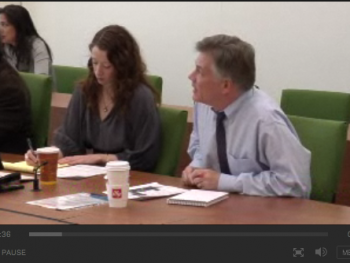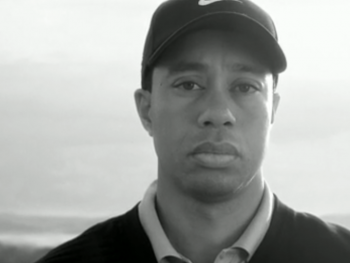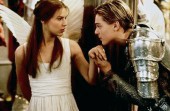The 2010 Masters Tournament at the Augusta National Golf Club
by Jeff Laughlin

Augusta National displayed its wariness with the evils of contemporary society quickly and efficiently. The signs at the entrance made everyone quite aware of the rules: there would be No Cell Phones, No Pagers, No Electronic Devices, No Guns, No Knives. They were more concerned with civility than the progress and survival of civilization. That may sound awkward or overly genteel, but civility turned out to be a lot more inviting than I had first thought.
I have never been in love with golf. The game itself just seemed to follow me around. I worked at a country club during the summers in New Bern, NC, when I was a teenager because my dad ran the pool there. I worked at another country club in Greensboro, NC, because I had a friend who could get me a job after college and I was broke. My friend M____ became obsessed with golf, so I had a buddy who talked about it a lot. It was a commodity I had no use for, and one I could not dismiss.
Golf was something old people did to pass time until they died. It was a sport for young aristocrats to get away from their cares. On the lips of every player, though, young or old, was Augusta National. The Masters. Even I revel in The Masters, as televised. The limited commercials, the easy-going nature of Jim Nantz and Verne Lundquist, and the sprinklings of nature accompanied by piano music make the program desirable after the high-octane college basketball season and before the NBA Playoffs.
But in person? At Augusta, the open areas of Georgia close up into a cluster of stores-not unlike the first glimpse of a theme park. The distance is not yet filled with leaderboards and the clack of clubs. At nine a.m., the gift shop is insanely popular. A visor purchase seems nearly mandatory.
* * *
Everything is immediate inside. Even before the leaders teed off, there were crowds of saved seats around every good area. The greens, packed with chairs, tagged with names; the grandstands already half-filled with people around the most exciting holes. We walked up on Amen Corner-at the 11th, 12th and 13th holes-early and the mood was already reverent: crowds moving around it like an altar; some just stood frozen. It’s catching. I became hooked into Augusta, my mouth open, my heart flopping about in my chest. I moved only to keep up, since I have no way of finding my friends if I lose them.
Around tee-time, the disappointed golfers play a Sunday round. Number three in the world, Steve Stricker, faltered early in the tournament and never recovered. That is Augusta; the course rewards experience before good play. Comfort is more important than being on point. Some golfers were not happy to be there, like Phil Mickelson or Tiger Wood were; not happy enough to escape the problems of everyday life. Mickelson loves the course because it is benign when you know it as well as he does. He can have rotten luck and still have a chance. Woods loves it because he can treat it badly and get away with it.
While I was following my favorite golfer of all time, Fred Couples, Woods’ approach on the 7th holed in for eagle. Then massive throngs overpowered my hero worship. I was watching someone I truly admired. Couples is perfection in athletics. He is a former Masters champion in 1992, a longtime respected champion, a sockless wonder in easygoing movement. His swing is effortless and his command of his game is as close to perfect as the course would allow. He was -9 and contending when Tiger, -5 and struggling, interrupted my reveries.
That was it. I had to follow Woods for a few holes after that. I was walking the fairway when I ended up a few feet away from his ball on 8 and when he swung, people stood slackjawed. It was like that the whole day. Even when I stopped following, the leaderboard, updated by hand, always reminded me he was there. When his scores went up, people held their breath. When they cheered, they were not cheering for Tiger, necessarily; they were cheering to be a part of history-for the selfishness of being there. Also, they were cheering for talent and perspective. A collective and audible roar on the 7th marked people’s respect for spectacle.
Phil, however, quietly made pars. His was a quiet and contemplative game. As he moved, the crowd moved ahead of him with Tiger. He played a bogeyless round, but seemed, still, to be blowing his chance. Forgotten in the glamour of Tiger’s follies was Phil’s year. He lingered as the second best golfer in the world, with lackluster tour performances. He avoided getting to tournaments for practice to steal more time with his sick wife and to help with his children. He was the anti-Tiger and his craft paid the price. Unlike Tiger’s brash bashing and brute force, Phil’s shots hung in the air and clung to the greens.
At the 9th, I was in the front row of the tee box. Phil wound up and rolled the ball over in his swing. I kept my eyes on him instead of watching the ball. He was despaired. At one point, he mouthed the word “Masters” as if he knew he might have cost himself the tournament, given the way Tiger and KJ Choi were playing. Lee Westwood was playing an average game, good enough for a share of the lead too. He was -12, they were just below him. His recovery from the woods-for par again-was the redemption of his season. It allowed him to save the word on his lips for his wife, waiting to hug him at 18, as a champion.
* * *
On ten, just before the aforementioned Amen Corner, a man complained loudly-seeking attention from the passers-by following the leaders up to the next three crucial holes. The sun was mercifully hid by loblolly pines (or so I think they were, I’m no Sibley) for a moment. The crowd stopped to look at him. He was beaming a huge smile. He said, “I’m gonna milk this for all it is worth.” An ovular redness resonated on his shoulder, his sleeves pulled up to present it to us. As I watched tournament officials approach the area, the place began to buzz. Tiger was approaching. Augusta rewarded the still and the moving. The still saw everyone at least once; the moving got the action between the lines. At crossovers, along fairways, near the tees, there was action to see. At the greens, the finality set in. It all depended on where you wanted to be and what you loved about sport. I was into it all. Seeing Tiger get a ruling and clear a path via security was not so exciting. I was ready to keep walking to beat Phil to 13-my second favorite hole on the course.
Then, Tiger pointed to the most obscure shot he had available. He was going right at the green through an impossible set of trees. We were shocked. There was no way for this to work, except we had all seen Woods do the impossible already. The approach on 7, the shot on 8. This was makeable only for him. He called out to an official: “I’m gonna need a lot more room. Especially near the green.” This was not confidence. It was a little cocksure. But Tiger is what he is: a man of immense golfing talent. Even as the shot dinged off a tree, the crowd was abuzz with his decision. History, again, was unmade, but we knew we had seen something unwieldy. A tournament can be like that. The way Mickelson played the back nine, we knew he was going to win. Still, we watched.
* * *
As for the rest: The Masters is a series of stories pressed together with names I cannot recall. I know I saw names struggle to find themselves on a course meant to define them. Ernie Els was tall, Steve Stricker was just some person (not the third best golfer in the game) and former champions were saddled with putts that just did not fall. Each hole is marked with just a sliver of usable green. Right to left they are wide, but designed to be useless — like a hard pillow with one soft spot where you have been sleeping for years. The course was made not to fool them, but to cull their greatest shots. Even the greatest golfers in the world cannot hit their greatest shots every hole. They do not have to. Imperfection can be tolerable, but you must wade through it with patience here.
Perhaps that is why the accidental tragedies are easier to correct than ones created through mistakes. Only the course feels infallible-every blade of grass perfect, every bunker wildly white in the sun, every tree with a story. At the 4th, a long, 240-yard par 3, golfers plopped into the front bunkers and blasted back behind the hole but each of them cursed themselves. M___ and I blamed the wind kicking into their faces; we rarely blamed the course. When we did, it was because they played the 4th the wrong way. Mickelson and Choi both said, after the tournament, that “the back 9 was where you made runs,” but the front (and maybe even the 4th) made or broke some rounds, I guarantee it.
When it was time to leave-the crowd around the champion was finally too much-I looked back over the course. Droves were heading out into the parking lot, the staff was waving and welcoming everyone back for next year, the crowd was buzzing about Phil and a final leaderboard ran the scores as we exited. It read -11 for Tiger despite 13 bogeys in the tournament, -16 for Mickelson with a bogeyless round, -12 for Anthony Kim, even after a flawless final run, Lee Westwood was second, though no one really mentioned him the whole trip. Couples finished -9. The scores ticked by with little f’s beside each name and we waited for the traffic to stop. This was all proudly on display just outside the entrance-just beyond the Augusta National property line. The scoreboard was electronic, of course.
Jeff Laughlin is the editor of 10 Listens.
The Book Of Sadness And Forgetting
It is better to remember the things that make you sad-like THAT ARTICLE, for instance-than to forget them, says Science, possibly because “it is the ability to store and reflect on emotional events that will ‘relieve some or most of the sad feelings.’” Sounds about right.
Pulitzers, Babies and WaPo Headlines

Tom Scocca: “It once did not matter if editors had all of their facts straight at the morning news meeting; there was plenty of time for reporting and editing. But with the world looking over their shoulders, things are different. Editors are dressing better, speaking in complete, sound-bite sentences, and mistakes are embarrassing.”
Choire Sicha: Uh oh.
Tom: I’ll let you go ahead and watch the TimesCast program for me.
Choire: Oh no. You’re not getting off that easy.
Tom: My browser is cloggy. Too many tabs! I am therefore Old Media.
Choire: Honestly? I can never get it to play in my browser.
Tom: Do they have an editors’ meeting now to prepare for the editors’ meeting?
Choire: I can’t imagine they’d have time to do that. Okay, I am actually watching the April 9th edition? And it’s very strange! Kind of cute? But they say like “And the top story of the day is…” And they show a story… published on the Times website? And then, you’re like… So that’s this morning’s news! Then there’s some traditional story-pitching to the team — jockeying for A1 space, I guess, etc. — that you are familiar with. Then there’s some jazz! Then there is some really fakey fake chat between editors in the newsroom itself? That part is absurdly faux.
Tom: It does say they have the power to say “Cut!” and have a do-over.
Choire: Yes. You know what, I dislike this. But I would like it if it was like raw feed from the A1 meeting?
Tom: Sure you would, but it would be stupid and irresponsible for them to do that.
Choire: HIGHLY.
Tom: Editorial meetings are not meant to be seen. This is the same mistake Newsweek made when it published its inane and offensive internal e-mail chain about when to use or not use the term “terrorism.”
Choire: I like the ideas behind these things?
Tom: What about the idea do you like?
Choire: So once upon a time those institutions were in the business of making a thing. Now they make a couple of things? Or at least a thing and then a thing highly related to the thing? And I view TimesCast etc. as both an extension of at least one of those things but also a way to understand the underpinnings of those things? I mean, you know I am a fan of the sausage getting made. But this isn’t the casings and the guts. This is just a PR initiative.
Tom: Look, I’m a big admirer of The Muppet Show.
Choire: Well who isn’t!
Tom: The structural genius of the Muppet Show was that the Muppets were performers putting on a theatrical production, so they were creating a frame within a frame — one more level of distance between the viewer and the guy crouching out of view with his hand in a felt bag.
Tom: The Muppets let you go “backstage.”
Tom: They presented “backstage” narratives explaining what went on between the curtains.
Tom: They even had Statler and Waldorf up there in their box, disparaging the show — at the Times, they would be the Public Editors.
Choire: I’m sure plenty of people in the Times would agree (not in a nice way though)!
Tom: So when they put Bill Keller in the TimesCast, is he Frank Oz, or is he Fozzie Bear?
Choire: In my limited sampling, he has not been much of a character? But I assume he has a hand in someone’s ass. (Or his head, or wherever a Muppet gets it?) Huh. Do you know what the top news story of the day is?
Tom: According to their meeting?
Choire: Yes.
Tom: Nukes? Someone playing golf?
Choire: Historic Nuclear Summit in Washington! Dow Breaks 11000! “Obviously the big news of the morning is the nuclear summit in Washington” is what AME Jim Roberts said at today’s meeting. 1. Is it? 2. I think they mean “news event”? Or something like “pre-news”? 3. If it is, it’s not at all on the front page of NYTimes.com except in the box that says “Today’s TimesCast.” Maybe it was earlier news but it turned out not to be news later and/or yet? THEN there is the fake back and forth again, in the news room, between Roberts and Marcus Mabry, a senior editor. Then there’s something about recycling in Denmark? And bootlegging in Pakistan?
Tom: That all sounds very responsible and worthy of the Newspaper of Record.
Choire: It… does. It’s also dull and vague as newsprint run through dish water.
Tom: I’m checking to see what’s Most Viewed:
# The Queen of Talk Declined to Speak
# Hallucinogens Have Doctors Tuning In Again
# Georgia on My Mind
# Leaders Gather for Nuclear Talks as New Threat Is Seen
# Worlds Without Women
Choire: Hmm! Well that’s not an un-match! Wait. I NEED TO HAVE A SIDEBAR.
Tom: “ . . . “
Tom: I hope it’s called “Sprezzatura.”
Choire: I…
Choire: You know what, I’ll just not have an opinion for once.
Tom: Me too. Anyway.The puppets. I don’t want the New York Times to let me into its editorial meetings.
Choire: Well they’re sort of NOT? Except they are enough to get in “trouble” with the “public editor.”
Tom: I’m saying: I don’t want them to do it for real, and I’d just as soon they stopped pretending to do it.
Tom: Can you imagine if we’d had a Webcam in Peter Kaplan’s office? Instead of merely the presumption it was all going to end up in somebody’s roman a clef?
Choire: Well, I mean, it’d be amazing! I’d like one at the Times too! I love the idea of the future where we can just look into anyone’s office. But. It’s not good for anyone or anything particularly? And I cannot imagine this isn’t a huge time-suck. And I believe, WITH NO EVIDENCE, that this is happening because of the “image” “problem” at the Times. I can see the PR department saying that “If we personalize the paper, people won’t ‘hate’ us.” Which isn’t wrong and also is wrong.
Tom: OK, well, let’s consider another ombudsperson’s column from the weekend.
Breitbart’s $100,000 challenge may be publicity-seeking theater. But it’s part of widespread conservative claims that mainstream media, including The Post, swallowed a huge fabrication. The incidents are weeks old, but it’s worth assigning Post reporters to find the truth.
Choire: Oh my. Oh, I thought that meant the New York Post. And I was like, “that’s weird.” Wait! It’s Pulitzer announcement hour!
Tom: Wait, Gene Weingarten won again?
Choire: He won in 08. And now…. has won… for THE STORY WE DO NOT MENTION.
Tom: Babies in cars?
Choire: SHHH. That’s two to the Times, this year, by the way.
Tom: It seems the Post won a lot.
Choire: Also nothing to the NY Post, the NY Daily News and the National Enquirer.
Tom: Now that the Washington Post is the best newspaper in America, can I vent about their atrocious headlines?
Choire: Sure!
Tom: So the kid looks at the front of the sports page today and reads “Another jacket up his sleeve.” You know how people are always yelling at the paper about HOW DO I EXPLAIN TO MY CHILD?
Tom: Well, how DO I explain that headline to my child?
Choire: “Another Jacket Up His Sleeve”? Huh?
Tom: I said, “OK, that’s a picture of a man who won a golf game. And the prize for winning that golf game is a jacket.”
Choire: Oh. Yeah, I needed that explainer too!
Tom: “And then when people say ‘Up his sleeve,’ they mean… well, they mean something is hidden, like there was some sort of trick or surprise prepared…which doesn’t really have anything do to with winning a golf game, so…”
Tom: Please, publish a picture of two men kissing!
Tom: That is very easy to explain.
Choire: Ha! You’re a minority parent on that one.
Tom: “They love each other.” The end.
Choire: Oh. Hmm.
Tom: But how do I explain to my child, now that he is reading things, that sometimes adults don’t care enough about stringing the words together in a way that makes sense?
Choire: I think that’s a very morally damaging lesson to teach your child.
Tom: I don’t want him exposed to that kind of perversion and depravity.
Tom: “Up his sleeve.”
Choire:
That’s just rude… I think. Or IS IT? I have no idea!
Tom: I’m going to have to start hiding the newspaper from him.
Choire: Can I say this about headlines as well?
WRAP ALERT: Subject: EXCLUSIVE: Washington Post Wins 4 Pulitzer Prizes
Tom: That is an alert from The Wrap?
Choire: Yes!
Tom: EXCLUSIVE. You know, I think I’m OK with them giving the prizes to what’s left of Old Media still, then.
Choire: Hmm! Are all these things related? Like if the staff of the Times is so busy putting on makeup for this fake TV show, are they (or people just like them!) too busy to write good headlines for the Washington Post?
Tom: Maybe. And the staff of the Post is too busy getting mau-maued by Andrew Breitbart? Over the question of whether or not the people who were screaming “faggot” were also screaming “nigger.”
Choire: Oh boy.
Tom: And whether anyone intentionally spat on a congressperson, or whether they just screamed in the person’s face with such force and lack of self-control that they sprayed spittle.
Choire: Well! I bet Kathleen Parker could get us some answers.
Choire: You know. The one with the Pulitzer?
Tom: Yeah, I didn’t even know what to say about that. She’s one of the better op-ed columnists at the Post, but it’s hard to express how minor an accomplishment that is. That just means she’s not obviously an imbecile, a partisan hack, and/or a liar.
Choire: Well that does deserve some kind of badge and/or prize.
Tom: Like getting off the Post op-ed page?
Choire: Now that’s a prize.
Choire: Ugh. I did it.
Choire: I fell into rereading the Weingarten story.
Tom: Happy afternoon! So are we going to put some of this up on the Web, to illuminate our internal process?
Choire: Only when I’m done weeping about the babies. And only if I can call it…
Choire: AWLCAST!
Tom: DONE AND DONE.
Powell vs. Rangel, Part Two (Or Three, Depending On How You're Keeping Score)

Fresh off a mostly acquittal for drunk driving, New York State Assemblyman Adam Clayton Powell IV has announced that he will challenge Rep. Charlie Rangel in the upcoming Democratic primary. Rangel, who has had some problems of his own, won his seat in 1970, defeating the incumbent Adam Clayton Powell Jr., who is IV’s dad. Here’s your fun fact for the day:
Powell and his third wife, Puerto Rican Yvette Diago Powell, had a son Adam Clayton Powell Diago, so named in the matrilineal tradition of some Latino cultures. This son changed his name to Adam Clayton Powell IV when he moved to the United States from Puerto Rico to attend Howard University to honor his family legacy. (This caused confusion because his nephew, only 8 years younger than he, already was named Adam Clayton Powell IV.)
Powell IV previously challenged Rangel in 1994 and got pasted. We’ll see if things are different now.
Sex and Golf and Advertising: Have You Learned Anything?
by Jonathan Beecher Field

Tiger Woods has always seemed peculiarly uninteresting to me. I became aware of the phenomenon of his dullness early in his career. I was out for breakfast on a Sunday, reading the sports page, which mentioned that a kid named Tiger was doing well at the Masters, and the server commented “How about that Tiger Woods?” I was literally at a loss for words. He is very good at golf, but his excellence has always been clinical-easy not to watch.
His recent troubles seemed painful on a domestic level, but hardly worthy of the attention they commanded. I am even tired of people saying they are tired of Tiger Woods.
I’ve also never had much interest in Nike as a brand. I avoid buying their shoes because of their association with sweatshop labor, but buy other shoes produced, no doubt, under similar circumstances. It’s the lazy hypocritical morality of someone (me) who avoids shopping at Wal-Mart, and goes to Target instead.
But this commercial. Tiger’s return to golf, and the simultaneous debut of this commercial, seems to put a period to this crisis for Tiger. As Tiger’s dead father asks, “have you learned anything”? Maybe so, but it’s nothing nice. There are (at least) three levels that the ad works on: literal, pop cultural, and personal.
Literally, it works as a sort of pillory by video. To agree to appear in an advertisement like this is an act of contrition, an act of contrition for the benefit of Tiger’s biggest and sole remaining sponsor. As it happens, this week I am getting ready to teach Lauren Berlant’s essay, “The Queen of America Goes to Washington City,” which treats the Anita Hill/Clarence Thomas case, among other things. Berlant does not quote the phrase, but Thomas referred to the proceedings as “a high-tech lynching.” Coming from Thomas, the phrase seemed unfortunate on several levels, given the gap between investigating allegations of sexual harassment against a Supreme Court nominee, and the routine murder and sexual mutilation of Black men for the crime of looking at white women. It’s not a lynching, but the Nike commercial does recall the custom of ritual humiliation for sexual misconduct that was popular among our Puritan forebears.
This act of contrition raises the question of what, exactly, Tiger owes Nike for their loyalty. He lost his other sponsors when he was caught in behavior remarkably similar to that which gained endorsement opportunities for Joe Namath. It does not seem to be a question of changing mores — much more recently, Tom Brady and Matthew Leinart have been caught in extramarital sexual relations with little damage to their public image. Tiger’s philandering, instead, was pathologized as “sex addiction.” I am not sure why. His race is a necessary part of the explanation, but I am not confident that it is sufficient.
In a broader popular cultural arena, it’s hard to imagine an advertisement that will do more to perpetuate Tiger’s humiliation through endless parody. It is Nike’s gift to the meme economy. Between when I write this and whenever someone reads this, the number of parodies will have exploded further, so I won’t bother quantifying. The static image and the off-camera voice puts a parody within the reach of anyone who owns a computer. The people who do Nike’s commercials are well aware of the media landscape the ad inhabits, and it’s impossible to imagine that they are not counting on these parodies to proliferate their message.
These first two contexts occurred to me only after the advertisement resonated for me on a painful personal level. As we all know, the advertisement features Tiger standing motionless, listening to the recorded voice of his dead father. I lost my father suddenly on a Thursday in the fall of 2006. As it happened I discovered after he died that I had a saved voice message from my father from the previous Sunday. He was calling about a Patriots win over the Bengals, how to use Picassa to save pictures from a trip, and to tell me that he loved me. I remember the message well, because I had to listen to it to re-save it every 21 days. That ritual was one of the hardest parts of learning to live without my father. As I observed to my spouse, carrying my phone around with me was like carrying a gun where if I pulled the trigger, it made me sad. After about 18 months, I accidentally pushed seven instead of nine, and the message was gone. I was very upset at the time, but ultimately relieved, I think. The recorded voice of a dead parent is just about as close as you can get to a universal abject. It was bad enough for me, and the privacy of my voicemail, in a benign context. I can’t begin to imagine what it would be like for Tiger to have his dead father’s words reappropriated to scold him before a teeming television audience, and to humiliate him ad nauseam via YouTube.
To judge from the reaction of his wife, Tiger did cause real pain to his family. But the aggrieved party is his wife. Nike chose to reward Tiger for his skill at hitting a little white ball with a stick. The public/private morality question that come up for politicians do not apply here. It’s not clear to me why Nike was inclined to insist on humiliating Tiger in a way that must be deeply painful for him on a personal level.
Reading Berlant’s article on race and sexuality in the 19th and 20th centuries did raise one disturbing possibility. The advertisement infantilizes Tiger, putting him in the position of the returning prodigal being chastened by his (dead) father. The person we see before us is not a man, but a boy. In making Tiger a boy, Nike mobilizes a rhetoric that has been used for centuries to disempower Black men in America. Even if its targets are white women marginal because of their professions, the threat of unrestrained Black male sexuality makes the white Nike-buying American public uneasy. In making Tiger its boy, Nike desexualizes Tiger in the hopes that he may once again be boring enough to help them sell golf equipment. That’s what I learned this weekend.
Jonathan Beecher Field is an assistant professor of literature at Clemson University, and the author of Errands into The Metropolis. He also contributes to The Gurgling Cod.
That Story That We Don't Talk About Gets a Pulitzer
The story that we do not mention under any circumstances has won a Pulitzer Prize-Gene Weingarten’s second in three years. (So he had a so-so ’09, so sue him!)
The Texas Stadium Massacre
Because who doesn’t like seeing things blow up, here is how the demolition of Texas Stadium played out yesterday. “In the end, just three pillars stood leaning, leading Herbert Gears, mayor of the Dallas suburb of Irving where the stadium was located, to joke to AFP: ‘Now we’ve got Stonehenge.’”
Shakespeare, Socially Networked

“We will have to use a bit of artistic license, we’ll have to assume in some circumstances that the characters are blissfully unaware of what the others are doing. Often Twitter is something you see right in the moment, what happens when you’re offline is quite easy to miss, unlike on Facebook.”
-Actor James Barrett plays Romeo in “Such Tweet Sorrow,” a new, modern production of Romeo and Juliet that takes place on Twitter.
The Spy Who Blocked Me
British intelligence agency MI5 is laying off staffers who “do not have the computer skills to use social networking sites such as Facebook and Twitter.” Welcome to the future!
With Marianne Faithfull as Sid Vicious' Mom

“Marianne Faithfull had been signed for the tricky role of Sid Vicious’s mother.” ALSO: “’What do I want with the fucking army?’ Johnny Rotten said [to Russ Meyer]. ‘You listen to me, you little shit. We won the Battle of Britain for you!’”
-Can you imagine! In which Roger Ebert meets with Malcolm McLaren and makes a film for the Sex Pistols.
